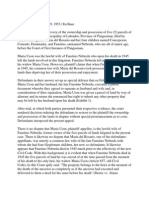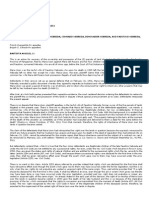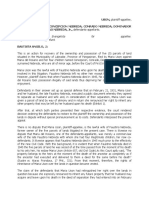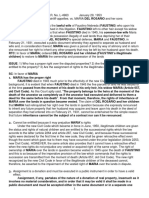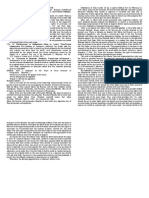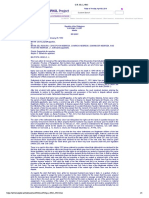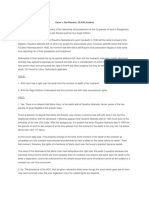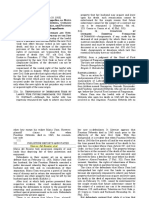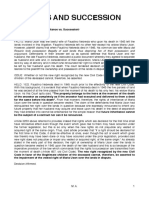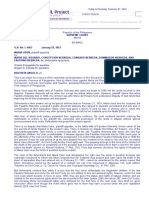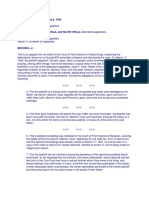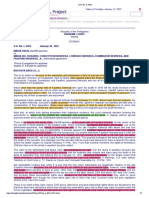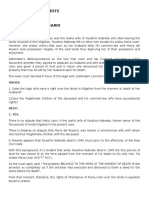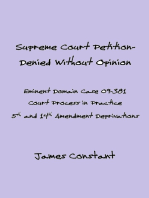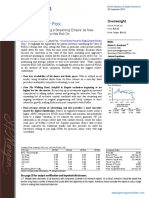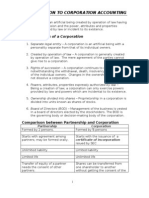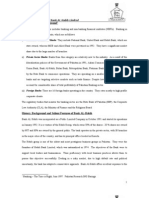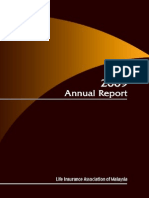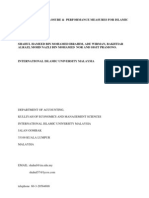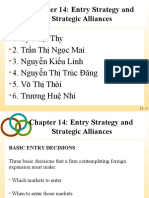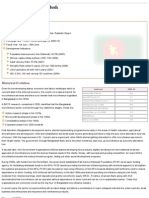Case Facts Issue Ruling
Case Facts Issue Ruling
Uploaded by
harvaeCopyright:
Available Formats
Case Facts Issue Ruling
Case Facts Issue Ruling
Uploaded by
harvaeOriginal Description:
Original Title
Copyright
Available Formats
Share this document
Did you find this document useful?
Is this content inappropriate?
Copyright:
Available Formats
Case Facts Issue Ruling
Case Facts Issue Ruling
Uploaded by
harvaeCopyright:
Available Formats
CASE FACTS ISSUE RULING
Effectivity of New
Rights:
UNSON v. DEL ROSARIO
Action for recovery of
the ownership and
possession of five (5)
parcels of land situated
in the Municipality of
Labrador, Province of
Pangasinan, filed by
Maria Uson against
Maria del Rosario and
her four children named
Concepcion, Conrado,
Dominador, and
Faustino, surnamed
Nebreda, who are all of
minor age, before the
Court of First Instance
of Pangasinan.
Maria Uson was the lawful wife of Faustino Nebreda
who upon his death in 1945 left the lands involved in this
litigation. Faustino Nebreda left no other heir except his
widow Maria Uson. However, plaintiff claims that when
Faustino Nebreda died in 1945, his common-law wife
Maria del Rosario took possession illegally of said lands
thus depriving her of their possession and enjoyment.
Maria Uson and her husband, the late Faustino
Nebreda, executed a public document whereby they
agreed to separate as husband and wife and, in
consideration of their separation, Maria Uson was given
a parcel of land by way of alimony and in return she
renounced her right to inherit any other property that
may be left by her husband upon his death.
the court rendered decision ordering the defendants to
restore to the plaintiff the ownership and possession of
the lands in dispute
Defendants Appealed
Contention of the Defendants:
As to the Illegitimate children, while it is true that the four
minor defendants are illegitimate children and under the
old Civil Code are not entitled to any successional rights,
however, under the new Civil Code, they are given the
status and rights of natural children and are entitled to
the successional rights which the law accords to the
latter (article 2264 and article 287, new Civil Code), and
because these successional rights were declared for the
first time in the new code, they shall be given retroactive
effect even though the event which gave rise to them
may have occurred under the prior legislation (Article
2253, new Civil Code).
W/N THE NEW
RIGHT
RECOGNIZED
BY THE NCC IN
FAVOR OF THE
ILLEGITIMATE
CHILDREN CAN
BE ASSERTED
IMPAIRING THE
VESTED RIGHTS
OF MARIA
USON
It likewise appears that Faustino Nebreda died in 1945 prior to the effectivity of the
new Civil Code.
With this background, the five parcels of land was seized of at the time passed
from the moment of his death to his only heir, his widow Maria Uson.
As this Court aptly said, "The property belongs to the heirs at the moment of the
death of the ancestor as completely as if the ancestor had executed and delivered
to them a deed for the same before his death" (Ilustre vs. Alaras Frondosa, 17
Phil., 321). From that moment, the rights of inheritance of Maria Uson over the
lands in question became vested.
The contention of the defendants has no merit in this claim. Article 2253 above
referred to provides that rights which are declared for the first time shall have
retroactive effect even though the event which gave rise to them may have
occurred under the former legislation, but this is so only when the new rights do
not prejudice any vested or acquired right of the same origin.
Thus, said article provides that "if a right should be declared for the first time in this
Code, it shall be effective at once, even though the act or event which gives rise
thereto may have been done or may have occurred under the prior legislation,
provided said new right does not prejudice or impair any vested or acquired right,
of the same origin."
As already stated in the early part of this decision, the right of ownership of
Maria Uson over the lands in question became vested in 1945 upon the death
of her late husband and this is so because of the imperative provision of the
law which commands that the rights to succession are transmitted from the
moment of death (Article 657, old Civil Code). The new right recognized by the
new Civil Code in favor of the illegitimate children of the deceased cannot,
therefore, be asserted to the impairment of the vested right of Maria Uson over the
lands in dispute.
The claim of the defendants that Maria Uson had relinquished her right over the
lands in question because she expressly renounced to inherit any future property
that her husband may acquire and leave upon his death in the deed of separation,
cannot be entertained for the simple reason that future inheritance cannot be the
subject of a contract nor can it be renounced
As regards the claim that Maria Uson, while her deceased husband was lying in
state, in a gesture of pity or compassion, agreed to assign the lands in question to
the minor children for the reason that they were acquired while the deceased was
living with their mother and Maria Uson wanted to assuage somewhat the wrong
she has done to them, this much can be said; apart from the fact that this claim is
disputed, we are of the opinion that said assignment, if any, partakes of the nature
of a donation of real property, inasmuch as it involves no material consideration,
and in order that it may be valid it shall be made in a public document and must be
accepted either in the same document or in a separate one (Article 633, old Civil
Code). Inasmuch as this essential formality has not been followed, it results that
the alleged assignment or donation has no valid effect.
WHEREFORE, the decision appealed from is affirmed, without costs.
Constitutional
Provision
BEUMER v. AMORES
Petitioner, a Dutch National, and respondent, a Filipina,
married in March 29, 1980. After several years, the court
declared the nullity of their marriage on the basis of the
formers psychological incapacity as contemplated in
Article 36 of the Family Code.
Consequently, petitioner filed a Petition for Dissolution of
Conjugal Partnership praying for the distribution of their
properties:
By Purchase: Lot 1, 2142, 5845, 4
In defense,
8
respondent averred that, with the exception
of their two (2) residential houses on Lots 1 and 2142,
she and petitioner did not acquire any conjugal
properties during their marriage, the truth being that she
used her own personal money to purchase Lots 1, 2142,
5845 and 4 out of her personal funds and Lots 2055-A
and 2055-I by way of inheritance.
Petitioner testified that while Lots 1, 2142, 5845 and 4
were registered in the name of respondent, these
properties were acquired with the money he received
from the Dutch government as his disability
benefit
12
since respondent did not have sufficient income
to pay for their acquisition.
W/N
PETITIONER
MAY BE
REIMBURSED
FOR THE
VALUE OF THE
PROPERTIES HE
HAD
PURCHASED
In In Re: Petition For Separation of Property-Elena Buenaventura Muller v. Helmut
Muller
23
the Court had already denied a claim for reimbursement of the value of
purchased parcels of Philippine land instituted by a foreigner Helmut Muller,
against his former Filipina spouse, Elena Buenaventura Muller. It held that Helmut
Muller cannot seek reimbursement on the ground of equity where it is clear that he
willingly and knowingly bought the property despite the prohibition against foreign
ownership of Philippine land
24
enshrined under Section 7, Article XII of the 1987
Philippine Constitution which reads:
Section 7. Save in cases of hereditary succession, no private lands shall be
transferred or conveyed except to individuals, corporations, or associations
qualified to acquire or hold lands of the public domain.
Undeniably, petitioner openly admitted that he "is well aware of the above-cited
constitutional prohibition"
25
and even asseverated that, because of such
prohibition, he and respondent registered the subject properties in the latters
name.
26
Clearly, petitioners actuations showed his palpable intent to skirt the
constitutional prohibition. On the basis of such admission, the Court finds no
reason why it should not apply the Muller ruling and accordingly, deny petitioners
claim for reimbursement.
Respondent maintained that the money used for the
purchase of the lots came exclusively from her personal
funds, in particular, her earnings from selling jewelry as
well as products from Avon, Triumph and Tupperware.
The RTC rendered decision dissolving the Conjugal
Partnership, awarding all the parcels of land to
respondent as her paraphernal properties; the tools and
equipment in favor of petitioner as his exclusive
properties; the two (2) houses standing on Lots 1 and
2142 as co-owned by the parties
Petitioner contested the RTCs award of Lots 1, 2142,
5845 and 4 in favor of respondent. He insisted that the
money used to purchase the foregoing properties came
from his own capital funds and that they were registered
in the name of his former wife only because of the
constitutional prohibition against foreign ownership.
Thus, he prayed for reimbursement of one-half (1/2) of
the value of what he had paid in the purchase of the said
properties, waiving the other half in favor of his
estranged ex-wife.
CORPSE IN SUCCESSION
ALMEIDA v. CARILLO
Macario Carrillo died in the City of Manila on May 17,
1931, leaving as next of kin, his widow, Rosenda
Almeida, the appellee, and his three children by his first
marriage, Corazon Edelmira Carrillo, Romulo Carrillo
and Gracia Carrillo, the appellants. With the consent of
all the relatives, the appellee caused the remains of the
deceased to be buried in the private lot of the Intengan
family in the North Cemetery, Manila, to be transferred
later after a period of three years but not more than five,
upon paying P100 for the use of the lot.
Sometime in January, 1963, the appellee built a
mausoleum in Bian, Province of Laguna, for the
remains of her late husband. Shortly before the
expiration of the period of five years for the exhumation
of said remains, the appellants secured the consent of
the appellee to have the remains of the deceased
whether or not
they have a
better right
than the
appellee to
disinter the
remains of the
deceased and
transfer them
to the place
they had
chosen.
The court held that the appellee's right, as the widow, is preferred.
We hold, then, that under the terms of said agreement, the appellee has a better
right than the appellants, and the latter cannot object to the transfer of the remains
of the deceased by the appellee to the mausoleum she built in Bian, Laguna.
The appellants allege that the appellee consented to the transfer of the remains to
the Ermita Church and that now she cannot validly oppose it. We find no merit in
this contention because it appears that the appellee erroneously gave her consent,
for she was made to believe by the appellants that the transfer of the remains to
the Ermita Church would only be temporary, and that her consent thereto would
facilitate the subsequent transfer to the mausoleum in Bian.
"It is generally conceded that on the death of a husband or a wife, the primary and
paramount right to possession of the body and to control the burial or other legal
transferred to the Ermita Church in Manila. As we was
made to understand that such transfer would only be a
temporary and that it would be easier to transfer the
remains from that place to the mausoleum, which she
had built in Bian, the appellee gave her consent.
Having been informed by her lawyer that she should not
have given her consent, she withdrew it, and inasmuch
as the appellants were about to remove and transfer the
remains, the appellee moved the court to enjoin the
appellants from removing the remains to the Ermita
Church. The motion was duly heard and thereafter the
court made permanent the preliminary injunction which
had been issued, and ordered the appellants to abstain
from removing the remains of the deceased and
transferring them to another place. Thereupon, the
appeal was perfected.
disposition thereof is in the surviving spouse, and not in the next of kin, at least in
the absence of a different provision by the deceased."
"The surviving spouse is entitled to select the place of burial and the place of
reinterment if the remains are removed after burial."
"The better rule seems to be, however, that if the widow has not waived her right,
she may, against the objections of the next of kin, remove her husband's body,
after interment, to another place of sepulture."
ART. 774 DEFINITION OF
SUCCESSION
VITUG v. CA
This case is a chapter in an earlier suit decided by this
Court
1
involving the probate of the two wills of the late
Dolores Luchangco Vitug, who died in New York, U. S.A.,
on November 10, 1980, naming private respondent
Rowena Faustino-Corona executrix. In our said decision,
we upheld the appointment of Nenita Alonte as co-special
administrator of Mrs. Vitug's estate with her (Mrs. Vitug's)
widower, petitioner Romarico G. Vitug, pending probate.
On January 13, 1985, Romarico G. Vitug filed a motion
asking for authority from the probate court to sell certain
shares of stock and real properties belonging to the
estate to cover allegedly his advances to the estate in
the sum of P667,731.66, plus interests, which he
claimed were personal funds. As found by the Court of
Appeals,
2
the alleged advances consisted of P58,147.40
spent for the payment of estate tax, P518,834.27 as
deficiency estate tax, and P90,749.99 as "increment
thereto."
3
According to Mr. Vitug, he withdrew the sums of
P518,834.27 and P90,749.99 from savings account No.
35342-038 of the Bank of America, Makati, Metro Manila.
On April 12, 1985, Rowena Corona opposed the motion
to sell on the ground that the same funds withdrawn
W/N THE
SAVINGS
ACCOUNT OF
THE SPOUSES
WITH THE
BANK OF
AMERICA
HAVING A
SURVIVORSHIP
AGREEMENT
FORMS PART
OF THE ESTATE
OF THE
DECEDENT
The conveyance in question is not, first of all, one of mortis causa, which should
be embodied in a will. A will has been defined as "a personal, solemn, revocable
and free act by which a capacitated person disposes of his property and rights and
declares or complies with duties to take effect after his death."
14
In other words, the
bequest or device must pertain to the testator.
15
In this case, the monies subject of
savings account No. 35342-038 were in the nature of conjugal funds
There is no showing that the funds exclusively belonged to one party, and hence it
must be presumed to be conjugal, having been acquired during the existence of
the marita. relations.
20
Neither is the survivorship agreement a donation inter vivos, for obvious reasons,
because it was to take effect after the death of one party. Secondly, it is not a
donation between the spouses because it involved no conveyance of a spouse's
own properties to the other.
It is also our opinion that the agreement involves no modification petition of the
conjugal partnership, as held by the Court of Appeals,
21
by "mere stipulation"
22
and
that it is no "cloak"
23
to circumvent the law on conjugal property relations. Certainly,
the spouses are not prohibited by law to invest conjugal property, say, by way of a joint
and several bank account, more commonly denominated in banking parlance as an
"and/or" account. In the case at bar, when the spouses Vitug opened savings account
No. 35342-038, they merely put what rightfully belonged to them in a money-making
venture. They did not dispose of it in favor of the other, which would have arguably
from savings account No. 35342-038 were conjugal
partnership properties and part of the estate, and hence,
there was allegedly no ground for reimbursement. She
also sought his ouster for failure to include the sums in
question for inventory and for "concealment of funds
belonging to the estate."
4
Vitug insists that the said funds are his exclusive
property having acquired the same through a
survivorship agreement executed with his late wife and
the bank on June 19, 1970. The agreement provides:
We hereby agree with each other and
with the BANK OF AMERICAN
NATIONAL TRUST AND SAVINGS
ASSOCIATION (hereinafter referred to
as the BANK), that all money now or
hereafter deposited by us or any or
either of us with the BANK in our joint
savings current account shall be the
property of all or both of us and shall be
payable to and collectible or
withdrawable by either or any of us
during our lifetime, and after the death of
either or any of us shall belong to and be
the sole property of the survivor or
survivors, and shall be payable to and
collectible or withdrawable by such
survivor or survivors.
We further agree with each other and the
BANK that the receipt or check of either,
any or all of us during our lifetime, or the
receipt or check of the survivor or
survivors, for any payment or withdrawal
made for our above-mentioned account
shall be valid and sufficient release and
discharge of the BANK for such payment
or withdrawal
The Trial Court upheld the validity of the above
agreement.
been sanctionable as a prohibited donation. And since the funds were conjugal, it can
not be said that one spouse could have pressured the other in placing his or her
deposits in the money pool.
The validity of the contract seems debatable by reason of its "survivor-take-all"
feature, but in reality, that contract imposed a mere obligation with a term, the term
being death. Such agreements are permitted by the Civil Code.
24
Under Article 2010 of the Code:
ART. 2010. By an aleatory contract, one of the parties or both
reciprocally bind themselves to give or to do something in
consideration of what the other shall give or do upon the happening
of an event which is uncertain, or which is to occur at an
indeterminate time.
Under the aforequoted provision, the fulfillment of an aleatory contract depends on
either the happening of an event which is (1) "uncertain," (2) "which is to occur at
an indeterminate time." A survivorship agreement, the sale of a sweepstake ticket,
a transaction stipulating on the value of currency, and insurance have been held to
fall under the first category, while a contract for life annuity or pension under Article
2021, et sequentia, has been categorized under the second.
25
In either case, the
element of risk is present. In the case at bar, the risk was the death of one party and
survivorship of the other.
However, as we have warned:
xxx xxx xxx
But although the survivorship agreement is per se not contrary to
law its operation or effect may be violative of the law. For instance,
if it be shown in a given case that such agreement is a mere cloak
to hide an inofficious donation, to transfer property in fraud of
creditors, or to defeat the legitime of a forced heir, it may be
assailed and annulled upon such grounds. No such vice has been
imputed and established against the agreement involved in this
case.
26
xxx xxx xxx
There is no demonstration here that the survivorship agreement had been
executed for such unlawful purposes, or, as held by the respondent court, in order
The CA held that the above-quoted survivorship
agreement constitutes a conveyance mortis causa which
"did not comply with the formalities of a valid will as
prescribed by Article 805 of the Civil Code,"
8
and
secondly, assuming that it is a mere donation inter vivos, it
is a prohibited donation under the provisions of Article 133
of the Civil Code.
VITUG assails the appellate court's ruling on the strength
of our decisions inRivera v. People's Bank and Trust
Co.
11
and Macam v. Gatmaitan
12
in which we sustained
the validity of "survivorship agreements" and considering
them as aleatory contracts.
to frustrate our laws on wills, donations, and conjugal partnership.
The conclusion is accordingly unavoidable that Mrs. Vitug having predeceased her
husband, the latter has acquired upon her death a vested right over the amounts
under savings account No. 35342-038 of the Bank of America. Insofar as the
respondent court ordered their inclusion in the inventory of assets left by Mrs.
Vitug, we hold that the court was in error. Being the separate property of petitioner,
it forms no more part of the estate of the deceased.
ROMULO A. CORONEL v.
CA
We cannot sustain this argument.
Article 774 of the Civil Code defines Succession as a mode of transferring
ownership as follows:
Art. 774. Succession is a mode of acquisition by virtue of which the
property, rights and obligations to be extent and value of the
inheritance of a person are transmitted through his death to
another or others by his will or by operation of law.
Petitioners-sellers in the case at bar being the sons and daughters of the
decedent Constancio P. Coronel are compulsory heirs who were called to
succession by operation of law. Thus, at the point their father drew his last
breath, petitioners stepped into his shoes insofar as the subject property is
concerned, such that any rights or obligations pertaining thereto became
binding and enforceable upon them. It is expressly provided that rights to
the succession are transmitted from the moment of death of the decedent
(Article 777, Civil Code; Cuison vs. Villanueva, 90 Phil. 850 [1952]).
Be it also noted that petitioners' claim that succession may not be declared unless
the creditors have been paid is rendered moot by the fact that they were able to
effect the transfer of the title to the property from the decedent's name to their
names on February 6, 1985.
Aside from this, petitioners are precluded from raising their supposed lack of
capacity to enter into an agreement at that time and they cannot be allowed to now
take a posture contrary to that which they took when they entered into the
agreement with private respondent Ramona P. Alcaraz. The Civil Code expressly
states that:
Art. 1431. Through estoppel an admission or representation is
rendered conclusive upon the person making it, and cannot be
denied or disproved as against the person relying thereon.
Having represented themselves as the true owners of the subject property
at the time of sale, petitioners cannot claim now that they were not yet the
absolute owners thereof at that time.
You might also like
- Short Feasibility Study For A Hotel Project in Asaba, Delta StateDocument37 pagesShort Feasibility Study For A Hotel Project in Asaba, Delta StateCedric Johnson100% (1)
- Paguirigan 19. SuccessionDocument101 pagesPaguirigan 19. SuccessionJephthah Castillo100% (1)
- Succession Case Digest 2Document103 pagesSuccession Case Digest 2Lumawag SaimonNo ratings yet
- Priscilo Evangelista For Appellee. Brigido G. Estrada For AppellantDocument131 pagesPriscilo Evangelista For Appellee. Brigido G. Estrada For AppellantDon SumiogNo ratings yet
- Succession Case #1-16Document47 pagesSuccession Case #1-16Jan PriorNo ratings yet
- Uson Vs Del RosarioDocument2 pagesUson Vs Del RosarioNic NalpenNo ratings yet
- 1 - Uson Vs Del Rosario (2x5 10)Document2 pages1 - Uson Vs Del Rosario (2x5 10)Angelic ArcherNo ratings yet
- 04 Maria UsonDocument2 pages04 Maria UsonmasterlazarusNo ratings yet
- Succession Case DigestDocument103 pagesSuccession Case Digestrian5852100% (1)
- Uson v. Del RosarioDocument3 pagesUson v. Del RosarioMartinCroffsonNo ratings yet
- Uson DigestDocument2 pagesUson DigestPJDNo ratings yet
- Priscilo Evangelista For Appellee. Brigido G. Estrada For AppellantDocument47 pagesPriscilo Evangelista For Appellee. Brigido G. Estrada For AppellantMikaNo ratings yet
- Uson V Del RosarioDocument3 pagesUson V Del RosarioHudson CeeNo ratings yet
- Priscilo Evangelista For Appellee. Brigido G. Estrada For AppellantDocument49 pagesPriscilo Evangelista For Appellee. Brigido G. Estrada For AppellantParis LisonNo ratings yet
- Parish Priest of Victoria Vs Rigor Full CaseDocument30 pagesParish Priest of Victoria Vs Rigor Full CasemarwinjsNo ratings yet
- Supreme Court: Priscilo Evangelista For Appellee. Brigido G. Estrada For AppellantDocument3 pagesSupreme Court: Priscilo Evangelista For Appellee. Brigido G. Estrada For AppellantAndrea Nicole ParceNo ratings yet
- 92 Phil. 530Document3 pages92 Phil. 530Aaliyah AndreaNo ratings yet
- Priscilo Evangelista For Appellee. Brigido G. Estrada For AppellantDocument2 pagesPriscilo Evangelista For Appellee. Brigido G. Estrada For AppellantJhuniven OrantesNo ratings yet
- Digest - Wills Dean Pagui Week 1Document26 pagesDigest - Wills Dean Pagui Week 1JeckNo ratings yet
- G.R. No. L-4963 - Uson v. Del RosarioDocument3 pagesG.R. No. L-4963 - Uson v. Del Rosarionv.grace100% (1)
- Uson Vs Del RosarioDocument2 pagesUson Vs Del RosarioDyords TiglaoNo ratings yet
- Supreme Court: Plaintiff-Appellee, vs. Defendants-AppellantsDocument2 pagesSupreme Court: Plaintiff-Appellee, vs. Defendants-AppellantsJoena GeNo ratings yet
- Plaintiff-Appellee Vs Vs Defendants-Appellants Priscilo Evangelista Brigido G. EstradaDocument3 pagesPlaintiff-Appellee Vs Vs Defendants-Appellants Priscilo Evangelista Brigido G. EstradaMichelle FelloneNo ratings yet
- Wills and SuccessionDocument91 pagesWills and SuccessionsandrasulitNo ratings yet
- Doc1 FinalDocument4 pagesDoc1 FinalMichelle Ann RuizNo ratings yet
- Succession Compiled CasesDocument33 pagesSuccession Compiled CasesianmichaelvillanuevaNo ratings yet
- Succession CasesDocument107 pagesSuccession CasesJhanelyn V. InopiaNo ratings yet
- Succession Case Digests Batch 1Document74 pagesSuccession Case Digests Batch 1Maria Samuelina Delabajan100% (1)
- Succession Case AssignmentDocument97 pagesSuccession Case AssignmentAidalyn MendozaNo ratings yet
- Case Digest in SuccessionDocument7 pagesCase Digest in SuccessionFruitie SyNo ratings yet
- G.R. No. L-4963 January 29, 1953 MARIA USON, Plaintiff-Appellee, vs. Maria Del RosarioDocument1 pageG.R. No. L-4963 January 29, 1953 MARIA USON, Plaintiff-Appellee, vs. Maria Del Rosariocrisanto m. perezNo ratings yet
- Del Rosario Vs UsonDocument2 pagesDel Rosario Vs Usonzedric santosNo ratings yet
- Uson Vs Del RosarioDocument2 pagesUson Vs Del RosarioVince UrbiztondoNo ratings yet
- 1 Uson V Del RosarioDocument2 pages1 Uson V Del RosarioChescaSeñeresNo ratings yet
- Cases For Wills and Succession CompilationDocument113 pagesCases For Wills and Succession CompilationRaffy LopezNo ratings yet
- Uson v. Del Rosario, 92:530 - AndresDocument31 pagesUson v. Del Rosario, 92:530 - AndresERNIL L BAWANo ratings yet
- Wills and Succession Atty Abugan AUSL, General Principles CasesDocument87 pagesWills and Succession Atty Abugan AUSL, General Principles CasesDoel LozanoNo ratings yet
- Wills and Succession PDFDocument91 pagesWills and Succession PDFRhaj Łin KueiNo ratings yet
- Priscilo Evangelista For Appellee. Brigido G. Estrada For AppellantDocument2 pagesPriscilo Evangelista For Appellee. Brigido G. Estrada For AppellantAlb GuarinNo ratings yet
- 532 Philippine Reports Annotated: Uson vs. Del Rosario, Et AlDocument2 pages532 Philippine Reports Annotated: Uson vs. Del Rosario, Et AlKenmar NoganNo ratings yet
- Succession Digests P1to60 JuradoDocument8 pagesSuccession Digests P1to60 Juradorunish venganzaNo ratings yet
- Uson v. Del RosarioDocument4 pagesUson v. Del RosarioPrincess Trisha Joy UyNo ratings yet
- Digests WillsDocument44 pagesDigests WillsNovie Amor100% (1)
- Full Text SUCCESSION CasesDocument425 pagesFull Text SUCCESSION CasesApril TuandaNo ratings yet
- Uson V Del Rosario Case DigestDocument2 pagesUson V Del Rosario Case Digesthistab100% (2)
- Facts: Borja v. BorjaDocument39 pagesFacts: Borja v. BorjaMarifel LagareNo ratings yet
- Uson v. Del Rosario - G.R. No. L-4963 PDFDocument2 pagesUson v. Del Rosario - G.R. No. L-4963 PDFAnn ChanNo ratings yet
- Simeon P. Mangaliman For Appellant. Adolfo A. Scheerer For AppelleesDocument11 pagesSimeon P. Mangaliman For Appellant. Adolfo A. Scheerer For AppelleesmaaaaeeeNo ratings yet
- 12 Rioferio Vs CA DDocument5 pages12 Rioferio Vs CA DMikaNo ratings yet
- Case Digest Succession 3Document8 pagesCase Digest Succession 3mark josephNo ratings yet
- Uson v. Del RosarioDocument2 pagesUson v. Del RosarioShayne SiguaNo ratings yet
- Wills Cases Part 1Document44 pagesWills Cases Part 1Kat De Los SantosNo ratings yet
- Uson v. Del RosarioDocument2 pagesUson v. Del RosariokrisNo ratings yet
- Succession Case Digests Nos. 16 To 20Document9 pagesSuccession Case Digests Nos. 16 To 20yanieggNo ratings yet
- MARCELINA EDROSO, Petitioner-Appellant, PABLO and BASILIO SABLAN, Opponents-AppelleesDocument12 pagesMARCELINA EDROSO, Petitioner-Appellant, PABLO and BASILIO SABLAN, Opponents-Appelleeslen_dy010487No ratings yet
- Cruz Vs CristobalDocument4 pagesCruz Vs CristobalEricka Jane CeballosNo ratings yet
- Succession CaseDocument2 pagesSuccession CaseRene ValentosNo ratings yet
- Cenon Fernandez vs. Cesar Mercader and Isabel NoelDocument3 pagesCenon Fernandez vs. Cesar Mercader and Isabel NoelpiptipaybNo ratings yet
- Report of the Decision of the Supreme Court of the United States, and the Opinions of the Judges Thereof, in the Case of Dred Scott versus John F.A. Sandford December Term, 1856.From EverandReport of the Decision of the Supreme Court of the United States, and the Opinions of the Judges Thereof, in the Case of Dred Scott versus John F.A. Sandford December Term, 1856.No ratings yet
- Supreme Court Eminent Domain Case 09-381 Denied Without OpinionFrom EverandSupreme Court Eminent Domain Case 09-381 Denied Without OpinionNo ratings yet
- Worst Judgements Passed by the Supreme Court of United States: Understanding Their Reasoning and LogicFrom EverandWorst Judgements Passed by the Supreme Court of United States: Understanding Their Reasoning and LogicNo ratings yet
- Order of Intestate SuccessionDocument10 pagesOrder of Intestate SuccessionharvaeNo ratings yet
- Facts:: People V. Henry Go-ConspiracyDocument3 pagesFacts:: People V. Henry Go-ConspiracyharvaeNo ratings yet
- Applicability of Other Laws: Revised Rules of Court - Sanctions The Use of The Revised Rules ofDocument4 pagesApplicability of Other Laws: Revised Rules of Court - Sanctions The Use of The Revised Rules ofharvaeNo ratings yet
- Resolved Cases Under NLRC DigestDocument2 pagesResolved Cases Under NLRC DigestharvaeNo ratings yet
- Numbered Correlatively in Letters (Succession Full Text) Art 805Document36 pagesNumbered Correlatively in Letters (Succession Full Text) Art 805harvaeNo ratings yet
- Confirmation PDFDocument4 pagesConfirmation PDFAnonymous Oe0eyXyWENo ratings yet
- Corporations SummaryDocument75 pagesCorporations SummaryVanessa ChenNo ratings yet
- FIN 301 Porter Chapter 13-2-Answer KeyDocument1 pageFIN 301 Porter Chapter 13-2-Answer KeyNery Rose CejalvoNo ratings yet
- JPM-Equity-Research-Report-Hulu You Should Read ItDocument31 pagesJPM-Equity-Research-Report-Hulu You Should Read ItS Ms100% (1)
- Kings College Jan2020Document75 pagesKings College Jan2020qwsx098No ratings yet
- Kajal BS Presentation 12Document15 pagesKajal BS Presentation 12Kajal JasejaNo ratings yet
- Financial LiteracyDocument6 pagesFinancial LiteracyAbdul Rehman Azhar Rana Muhammad Azhar IqbalNo ratings yet
- SBR 2020-21 MCQ Progress Test 2 AnswersDocument11 pagesSBR 2020-21 MCQ Progress Test 2 AnswersA JamelNo ratings yet
- Nism Question BankDocument66 pagesNism Question Bankavinash sengarNo ratings yet
- Corporation Accounting - IntroductionDocument7 pagesCorporation Accounting - IntroductionErica Calzada50% (2)
- Bank AlhabibDocument16 pagesBank Alhabibamtulbaseer0% (1)
- Barrons - May 17 2021Document80 pagesBarrons - May 17 2021vnmasterNo ratings yet
- Liam Annual2009Document42 pagesLiam Annual2009L.b. ChanNo ratings yet
- Stand Alone Risk PDFDocument26 pagesStand Alone Risk PDFlander21100% (1)
- In Compliance December 2011Document32 pagesIn Compliance December 2011Ian BrumptonNo ratings yet
- A Study in Mutual Funds in IndiaDocument91 pagesA Study in Mutual Funds in IndiaNazir Ahmad AmirNo ratings yet
- Alternative Disclosure and Performance Measurement of Islamic BanksDocument51 pagesAlternative Disclosure and Performance Measurement of Islamic BanksDr. Shahul Hameed bin Mohamed Ibrahim100% (9)
- Objectives of SezDocument48 pagesObjectives of Sezasandilya100% (1)
- Unit 1Document19 pagesUnit 1Kunal MakodeNo ratings yet
- Chapter 14: Entry Strategy and Strategic AlliancesDocument35 pagesChapter 14: Entry Strategy and Strategic AlliancesVip's SakariyaNo ratings yet
- Taxationlaw BarlisDocument11 pagesTaxationlaw Barlisitatchi regenciaNo ratings yet
- Eun 10e International Financial Management PPT CH04 AccessibleDocument34 pagesEun 10e International Financial Management PPT CH04 AccessibleMaciel García FuentesNo ratings yet
- FMCG IndustryDocument7 pagesFMCG Industrysaurav0975% (8)
- Microfinance in Bangladesh: General BackgroundDocument6 pagesMicrofinance in Bangladesh: General BackgroundFotoClippingNo ratings yet
- Dendrite International, Inc.: Entering The Central and East European MarketDocument39 pagesDendrite International, Inc.: Entering The Central and East European MarketyodamNo ratings yet
- MCB - Circular Proposed DiversificationDocument12 pagesMCB - Circular Proposed DiversificationWui Kiong HoNo ratings yet
- Name: Nitesh Bagla Enrollment No: 19Bsp1776 IBS Campus: Kolkata Mobile No: 9681759023 E-Mail Id: SIP Proposal I. SIP ProposedDocument3 pagesName: Nitesh Bagla Enrollment No: 19Bsp1776 IBS Campus: Kolkata Mobile No: 9681759023 E-Mail Id: SIP Proposal I. SIP ProposedNitesh BaglaNo ratings yet
- FM Theory QuestionsDocument12 pagesFM Theory QuestionsAbhijeetNo ratings yet
- Payment and Settlement SystemDocument16 pagesPayment and Settlement Systemchitra_shresthaNo ratings yet









